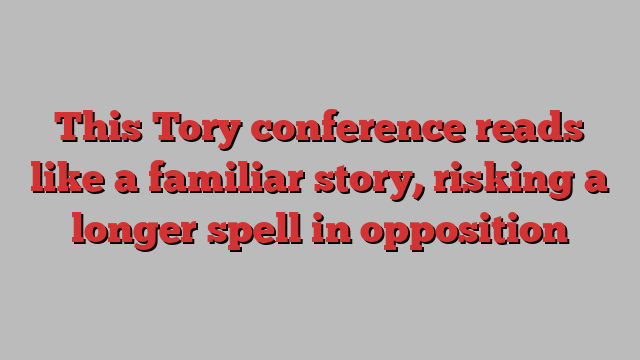
This article is an on-site version of our Inside Politics newsletter. Subscribers can sign up here to get the newsletter delivered every weekday. If you’re not a subscriber, you can still receive the newsletter free for 30 days
Good morning from Birmingham. The Conservative party’s first conference since entering opposition finds the party in a state of suspended animation. All four remaining leadership candidates know that a mistake this week, or a particularly good speech, could change the dynamic of the contest. As it stands, though, it looks like a very familiar story.
Inside Politics is edited by Georgina Quach. Read the previous edition of the newsletter here. Please send gossip, thoughts and feedback to [email protected]
Call of the wild
This is the third party conference I have attended in which the party hosting it has just entered opposition: 2010, when Labour’s 13-year period in government had come to a close the previous spring, 2015, when the Liberal Democrats had been reduced to just eight seats in the wake of their five-year stay in coalition, and now 2024.
And all three of those conferences had a similar mood on their first day. Despite having gone down to a historically bad defeat, each party was surprisingly chipper. All felt that the new government was struggling to find its feet. (And, to be fair, in all of those cases they were right.) All were rather enjoying opposing painful cuts in the new government’s budget. And all hoped that come the next election they would be back in business. (Which they weren’t.)
In 2010 and 2015, the Labour party and Lib Dems respectively picked a leadership candidate who disavowed their record in office and moved the party closer to its activist base. Both parties did pretty poorly in the election that followed. The Labour party lost seats in 2015, and the Lib Dems lost votes.
At Conservative party conference so far, the candidates who are currently leading the pack to succeed Rishi Sunak as Tory leader are offering a similar diagnosis. Robert Jenrick, the bookmakers’ favourite, told party members that they lost the election in part because they lacked “the ballast of knowing what this party believes in”, and said that the Tory party needed to get back “some religion”. His rival Kemi Badenoch is telling members that they lost because they did not lead and became too obsessed with focus groups: the usual message when a party wants an excuse to ignore the voters it lost and vanish into the wilderness. At one fringe meeting, party members were encouraged to purchase hats with the slogan “Make the Tory party Conservative again”.
This is a party that looks pretty set upon doing what first-term oppositions always do: deciding that it lost because it wasn’t sufficiently like itself, and then losing the next election. Now, of course, it’s true to say that this doesn’t always happen. Both Labour in 1970 and the Conservatives in 1974 moved away from the centre and returned to government after a single term in opposition. That happened in part because the 1970s were a period of repeated geopolitical shocks, but you can see how the 2020s might end up being a similar decade.
At this Conservative conference, and at Labour conferences after their defeats in 2010 and 2015, the success of Margaret Thatcher, whose reaction to defeat was to move the Conservative party away from what was then considered the centre of British politics, has been frequently cited.
But in general, what happens to most opposition leaders who go to bed thinking they are Thatcher is that they wake up and realise they have ended up more like former Labour leader Michael Foot: that their party has lost again and is going to have to wait another five years to get back into office.
Now try this
The trouble with Birmingham is it has any number of terrific restaurants that insist on being closed on Sundays. If it hadn’t been a Sunday, I would have gone to the delightful Adams yesterday, but as it was, I got room service and watched a below-average movie (The Intern) on Netflix.
Top stories today
-
Labour MP resigns over ‘hypocrisy’ | Keir Starmer is to tighten up UK rules on declaring ministerial “freebies” after a Labour MP quit the party denouncing the prime minister’s acceptance of free gifts and his “cruel” decision to cut winter fuel payments.
-
Manoeuvres in the dark | A company funnelling cash to Conservative leadership candidate Tom Tugendhat was set up last November, months before the general election was called.
-
Pension decisions | Rachel Reeves is unlikely to cut pension tax relief for higher earners in her Budget next month because it would hit teachers, doctors and other better paid public sector workers, according to a report released today.
-
Stop the fighting | Rishi Sunak has used a farewell address to party members to warn that the Tories will be consigned to the margins of politics for good unless they end their internecine feuding. The speech came as it emerged Sunak’s key lieutenant Oliver Dowden, former deputy prime minister, has been interviewed in the official investigation into betting on the date of the general election.
-
Row over Kemi comments | Tory leadership contender Kemi Badenoch has suggested that maternity pay in the UK is “excessive” and that people had more children before it was widely introduced, before rowing back on her position.
Recommended newsletters for you
US Election Countdown — Money and politics in the race for the White House. Sign up here
One Must-Read — Remarkable journalism you won’t want to miss. Sign up here